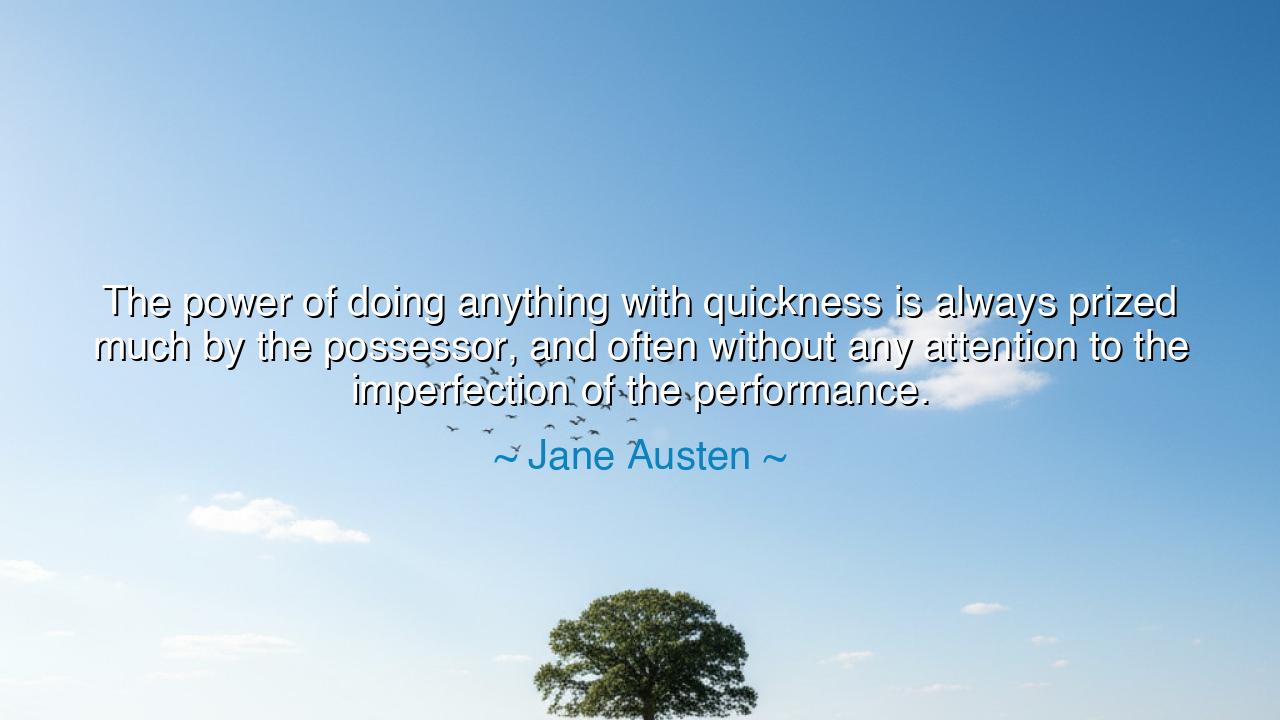
The power of doing anything with quickness is always prized much
The power of doing anything with quickness is always prized much by the possessor, and often without any attention to the imperfection of the performance.






Hearken, children of the ages, to the discerning words of Jane Austen, who declared: “The power of doing anything with quickness is always prized much by the possessor, and often without any attention to the imperfection of the performance.” In these words lies the eternal truth of speed, pride, and the perils of superficial mastery. To act swiftly is a gift, yet it may blind the possessor to flaws, leading the unreflective to overvalue swiftness while neglecting quality, depth, and discernment.
Austen teaches that haste can breed illusion. The ability to complete tasks rapidly is often admired and celebrated, but it is not in itself the measure of excellence. Swift action, when unaccompanied by careful thought or attention to detail, risks imperfection. True mastery demands a balance between speed and precision, between the swiftness of execution and the thoroughness of performance.
Consider the life of Napoleon Bonaparte, whose remarkable quickness in decision-making and action brought him vast military and political success. Yet, on occasion, his rapid judgments led to overextension and unforeseen disasters, demonstrating Austen’s insight: speed is prized, but without care, flaws emerge, sometimes fatally. The swift and decisive are admired, yet wisdom tempers swiftness with foresight and reflection.
The ancients themselves recognized the dual nature of speed. Greek strategists and Roman engineers prized rapid execution, yet Plato and Seneca warned that haste without contemplation undermines virtue and excellence. Austen’s reflection echoes this timeless understanding: the allure of quickness must be tempered by attentiveness, else the performance, however rapid, falls short of true merit.
Thus, her counsel is both admonition and guidance: honor your capacity for swift action, yet measure it against care, thought, and integrity of execution. Speed is not a virtue unto itself; it is a tool to be wielded with discernment, lest the possessor prize haste over quality, brilliance over accuracy, and motion over purpose.
Carry this teaching, children of generations yet unborn: cultivate both swiftness and thoroughness, action and reflection, so that your deeds shine with both energy and excellence. In this harmony lies the enduring path to mastery, the wisdom to act rightly, and the recognition that the value of speed is magnified only when joined with precision, judgment, and care across the ages.






QTLe Thi Quynh Trang
This quote makes me think about the modern obsession with multitasking and doing things quickly. Often, people rush through work just to appear competent or busy, ignoring flaws that matter. Austen’s observation suggests that self-satisfaction doesn’t always align with objective excellence. How can we cultivate an appreciation for thoughtful, deliberate effort in a culture that rewards rapid output, without discouraging initiative or ambition?
UNThu Uyen Ngo
What strikes me is the tension between pride and imperfection. Austen highlights a kind of self-deception where the possessor values the act itself rather than its results. I’m curious if this tendency stems from ego, societal praise, or practical necessity. How do we teach people, both historically and today, to balance speed with accuracy, and to value diligence alongside efficiency without diminishing their sense of accomplishment?
TKhuyen nguyen thi khanh
I find this statement both amusing and insightful. It seems that the satisfaction of finishing something quickly can blind people to imperfections. I’d like to ask whether this is a universal human trait or more of a social expectation, especially among those who are admired for productivity. Could this explain why some achievements are celebrated for speed rather than substance, even when the quality is mediocre?
VVVan Van
This quote makes me reflect on how society often values speed over quality. Jane Austen seems to point out that people take pride in accomplishing tasks quickly, even if the result is flawed. I wonder if this mindset is more prevalent today with our obsession with efficiency and instant gratification. Does focusing on speed hinder true mastery, or can rapid execution coexist with skillful performance?